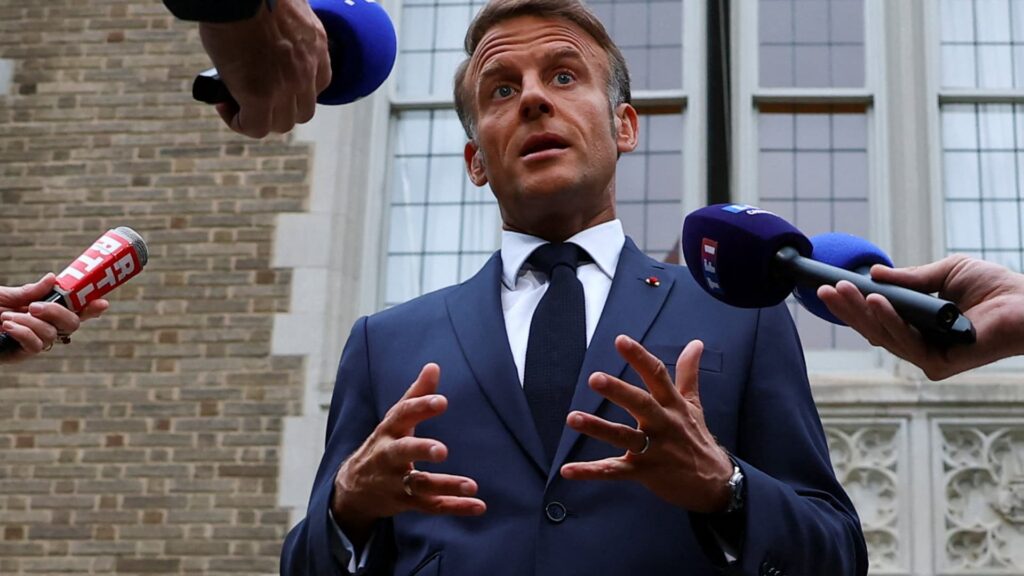French President Emmanuel Macron speaks with the media after a meeting with U.S. President Donald Trump, Ukrainian President Volodymyr Zelenskiy and European leaders, amid negotiations to end the Russian war in Ukraine, at the French Embassy in Washington, D.C., U.S., August 18, 2025.
Yves Herman | Reuters
France was thrown into further political chaos this week by the ousting of yet another prime minister after continued budget deadlock.
Prime Minister Francois Bayrou and his centrist minority government lost a confidence vote Monday, with a total of 364 lawmakers voting against the government and only 194 in favor.
The latest government collapse was widely expected after Bayrou failed to win support from political rivals for 2026 budget plans aimed at reducing the country’s yawning budget deficit amounting to 5.8% of gross domestic product (GDP) in 2024.
Bayrou’s government was targeting around 44 billion euros ($52 billion) in cuts in next year’s budget to get the deficit down to 4.6% of GDP in 2026.
France’s Prime Minister Francois Bayrou delivers his general policy statement during the parliamentary extraordinary session prior to a confidence vote over the government’s austerity budget, at the National Assembly in Paris on September 8, 2025.
Bertrand Guay | Afp | Getty Images
France’s financial markets reacted calmly to the latest political upheaval, with the CAC 40 opening 0.25% higher. The yield on France’s benchmark 10-year bond was 2 basis points higher at 3.4755% Tuesday morning, reflecting nervousness over the latest dose of political end economic uncertainty from Paris.
Bayrou will hand his resignation letter to French President Emmanuel Macron on Tuesday, and a new government and premier will be nominated “in the next few days.”
None of the options available to Macron will appeal to him.
Macron can choose a new prime minister — the fifth PM in less than two years — or create a technocratic government, but both motions are likely to face the same political opposition to budget cuts. The president could also call another snap parliamentary election, but that too could deliver an inconclusive result, or give even more seats to the far-right National Rally or to the far-left France Unbowed party.

Macron is seen as likely to choose yet another centrist ally to lead the government, but he will need to find a candidate who is a consensus builder and who can unite disparate political positions and demands.
“With the far-right National Rally and the far-left France Unbowed calling for snap elections, this would likely require a PM that can keep the centre-left Socialists from voting against the budget, as well as keeping the current centre-right coalition on board,” macro strategists at Deutsche Bank said in analysis Tuesday morning.
Negotiations between Macron and various parties over the coming days will need to be monitored, according to Raphael Brun-Aguerre, senior economist at JPMorgan.
“A new lower house election cannot be ruled out, but Macron will push for a grand coalition government,” he added.
A sign that says Bye bye Bayrou during the Pot de depart de Bayrou a rally in front of the town hall of the 20th arrondissement of Paris to celebrate the fall of the Francois Bayrou government in Paris France on September 8, 2025.
Bastien Ohier | Afp | Getty Images
Either way, the post-Bayrou government is likely to consider some degree of fiscal consolidation next year, Brun-Aguerre stressed, noting that “it will be difficult for forthcoming governments to escape this topic.”
The problem becomes just how to tackle fiscal consolidation.
“While almost all parties agree on the dire state of France’s public finances, political camps are strongly divided over whether to address this problem through welfare reforms or tax hikes,” Carsten Nickel, deputy director of Research at Teneo, said in emailed notes Monday.
While France has some experience with the president and the prime minister hailing from different political families under a structure known as “cohabitation,” so-called “grand coalitions” in the National Assembly are not part of the country’s political culture.
“This complicates the search for big compromises that would entail a mix of both approaches to the country’s fiscal challenges,” Nickel added.
Immediate upheaval
A new PM will also get a measure of public anger over proposed spending cuts and reforms, with unions calling for nationwide anti-austerity protests on Sept. 10 and Sept. 18.
Nonetheless, the need to reduce France’s budget deficit remains a priority, and a sense of urgency could be impressed upon France this week when Fitch Ratings Agency releases an update on Europe’s third-largest economy, which it currently rates at ‘AA-‘ with a negative outlook.

Credit “ratings downgrades for French bonds seem possible,” Holger Schmieding, chief economist at Berenberg Bank, said in emailed comments out Tuesday, noting that a Fitch downgrade on Friday would not come “as a major surprise.”
Yet, Schmieding cautioned that a “genuine financial crisis with a self-reinforcing doom loop,” of higher bond yields leading to bigger budget deficits and even higher borrowing costs, “remains quite unlikely for the time being.”
“With its almost balanced current account, France is no obvious candidate for a financial crisis. Of course, we cannot rule it out completely. If the French Socialists, who hold the balance of power in a deeply divided parliament, continue to reject common sense and insist on unfinanceable demands, the risk could rise,” he noted.

